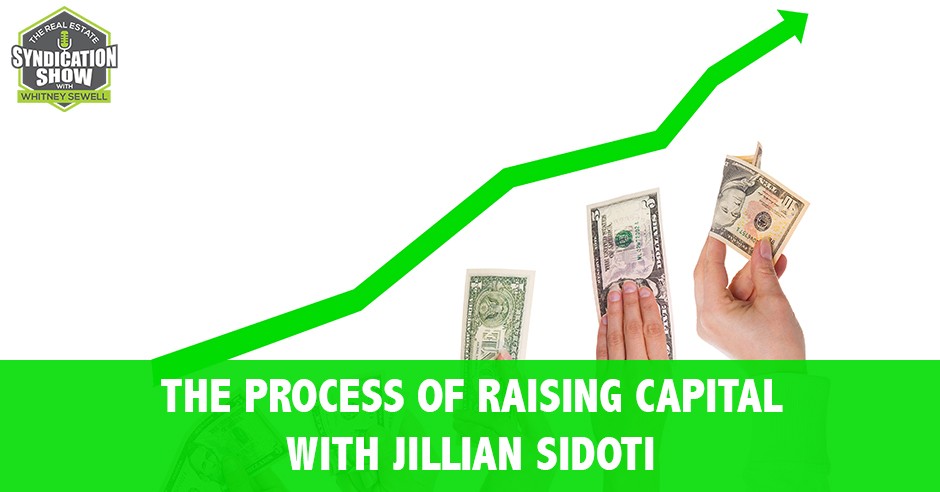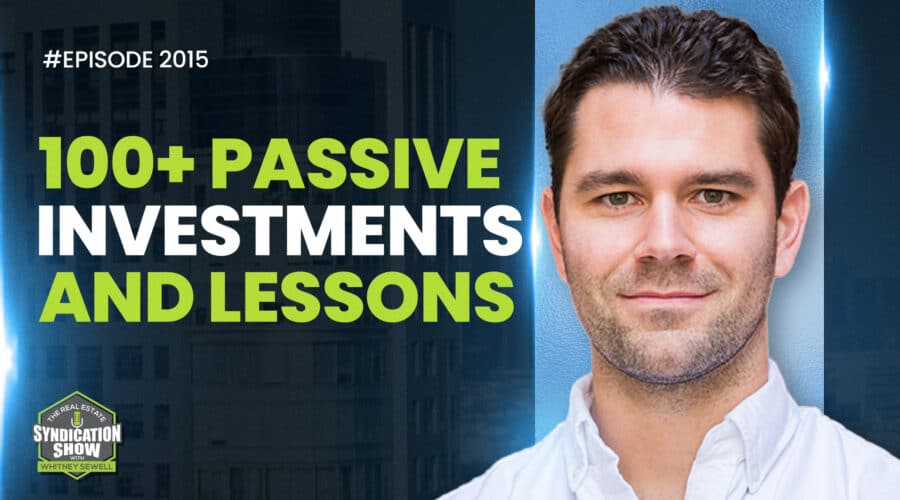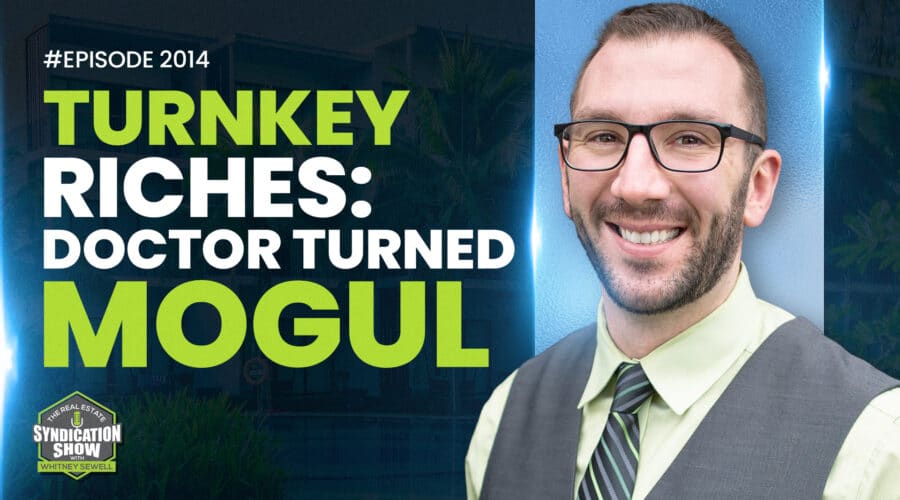Listen to the podcast here:
—
Watch the episode here:
The Process of Raising Capital with Jillian Sidoti
Our guest is Jillian Sidoti. Thanks for being on the show again, Jillian.
Thank you for having me again. What an honor.
I’m pleased to have you back. You’re definitely an expert in this industry that everybody that’s following the show needs to know. If you haven’t heard of Jillian before, I will encourage you to go back and read episode WS252. We got into a little more of her background. She’s one of the leading syndication attorneys in the country. I would encourage you to look her up. She’s speaking at many events, educating lots of people about this industry and how to do it legally. We had got a great show about how to pay capital raisers or how not to pay them and make sure that we’re doing it correctly. We’re going to get into some capital raising techniques and some things that you’ve seen work. Give the audience a little bit about who you are and let’s dive right in.
I help real estate entrepreneurs or any entrepreneur figure out how to raise equity mostly for their deals. In some occasions, we’ll help them figure out how to raise debt. A lot of times what I find out is that banks don’t like debt behind them, even though it’s behind them. We focus on the equity and how to put that together in a way that’s palatable both to the issuer and to the investor.
You are focusing on how to put the equity together. Can you elaborate on that a little bit?
For example, I get a lot of people who come to me and say, “I need to be able to say to my investors, they’re going to make X amount of dollars or they’re going to make a certain ROI.” A lot of times what I find, especially in a newer issue might not be very comfortable with doing something outside of saying, “I’m going to give you an interest rate of X.” A lot of banks don’t like debt behind them, so you can’t offer that interest rate of X. How do we come to a conclusion where everybody’s happy? Investors know where they stand and the issuer can clearly state, “I am going to pay you X on your money.”
What we normally see is that a lot of real estate entrepreneurs, in particular, we’ll use a preferred return where they’ll say to the investor, “I’m going to pay you 8% on your money before I pay myself.” That gives the investor a little bit of confidence to know that they stand in front of the issuer and that their money is going to be taken care of before the issuer gets taken care of, or the management of the issuer gets taken care of. It’s a nice way to be able to say, “I’m going to get you a certain percentage, a certain return on your investment prior to getting myself.” It acts like debt. It looks like debt, but it’s not debt. It’s equity.
[bctt tweet=”No one else is going to brag about you if you don’t talk about yourself.” username=””]
For somebody that’s not used to hearing some of those terms, like the bank doesn’t like to have the debt behind them or the debt versus the equity, could you elaborate on that a little bit?
We’ll use multifamily as an example because multifamily is hot. If you go out to buy a multifamily property, a lot of times what the bank will say to you is, “We’ll give you 70% on this particular property.” If you’re going out and buying $1 million property, that means the bank is going to give you $700,000 which means you have to come up with $300,000 to put down your down payment. You’ll probably need more than that, especially if it’s a value add or there are some tenant improvements or if you have a roof that’s going to be caving in any minute. You need to make sure you have enough money. Let’s just say to take care of that $1 million property, you need $500,000 in cash.
If you go to your investors and say, “Give me $500,000 in cash and I’m going to give you notes.” The bank doesn’t particularly care for that. They want to be the only debt holder. That’s the way it is. When I was doing real estate back in 2004, 2005, it was easy to get three deeds of trust on the property. We did it. We had three deeds of trust on a property, a big bank followed by, generally speaking, a bridge lender and then a hard money lender. We put on whatever we can put on that property. That can’t happen anymore. Banks don’t like it. They don’t like the risk of smaller investors. They don’t want their position, even though it’s the first position ever to be compromised.
That’s why we say you need to offer your investors equity as opposed to debt because the banks don’t want to see that debt. They don’t want to see notes, they don’t want to see obligatory interest payments being made to other investors. If you do a preferred return, you’re able to offer your investors a stated return. What it means is preferred over other equity. Your equity, for example, as the issuer. What we’re saying to the investors is, “If we have the return, we’ll pay you the return as opposed to a contractual obligation of paying interest under note.”
I haven’t heard that term before, you’re able to offer a stated return.
You don’t have to offer the stated return. I use the example of 8% preferred return, but we often see things. The target IRR is between 15% and 20%. What are those people doing in that circumstance? They’re certainly not offering a preferred return of 15%. If they are offering a preferred return of 15%, my suggestion to use to not invest in that because if it’s too good to be true, it probably is. That’s a very dangerous situation to be in. We can explore that a little more, but I see these targeted returns of 15% to 20%. What are those people doing? What are they offering? They’re offering a preferred return, like 8%. The investor gets 8% on their money and then they’re doing an equity split on the backend. The first 8% on the money goes to the investors. The remaining cash available for distributions would be split between the investors and the management. There are a variety of different ways to do that. You have to work out your own numbers and figure out what works for you and what works for your investors.
I appreciate you are going through that a little bit and it’d be great to do a show on the structuring and splits and some of that as well. Some steps may be that you’ve seen people raise capital and/or have been successful on that and done it correctly or legally. Could we go into that a little bit?

I’m going to make this super simple and some of you are going to say, “Jillian, I already know that.” I know and there’s a lot of stuff that’s going to be obvious about what I’m about to say, but it’s important. The first step is to get a company together before you go out and raise capital. I see it happen all the time. Somebody will call me and say, “I’m doing my first single-family flip and I want my uncle, my cousin, my nephew and my daughter to all invest with me.” I’m going to give them a note. Don’t have that note with yourself. Have the note with an LLC, a corporation or a partnership, something or anything. All of you real estate entrepreneurs out there, you’re most likely going to do an LLC. Get yourself an LLC together so your investors have somewhere actually to invest.
We’re going to have an LLC. We’re keeping that out of our name. They’re not investing with us personally, they’re investing in our LLC.
Number two, you get to determine how much money you’re going to need. The worst thing you can do is say, “I need $300,000 to close on this property,” then you have to go back to the investors and say, “I need another $200,000 because I forgot that we needed to make tenant improvements.” You want to make sure that you determine how much money you need before you start going to your investors. You have to figure out what you can manage. You have to figure out what’s available and what you know. The next step from that is to make your plan and your plan isn’t just what we’re going to invest in. You probably already know that, but you need to make a plan so you can answer your investors’ questions.
What do investors want to know? They want to know the who, what, where, when, how, etc. They want to know how you’re going to do this. When are they going to get their money back? Where their money is going to go? It’s important to tell them where their money’s going to go. For example, if you’re going to take a fee for your services as the manager, you need to tell them that their money is going to go towards that fee. It’s an important disclosure. People need to know who you are and who’s going to be the steward of their money. Another thing you need to answer more for yourself than for your investors is how much money have you the issuer, the manager going to make? I think this might be the most important thing that I’ll say is people discount what they need in order to do this type of work.
This work is not easy. Syndicating real estate, managing real estate is not easy and if anybody told you it was, they lied. You need to get paid for doing this very difficult work. Part of making your plan is planning how much money you’re going to make. If you’re not making enough money to make it worth it for you, then it’s not going to be worth it for anybody because you are going to be disenfranchised. You’re not going to work as hard for investors. It is bad for you and for your investors if you don’t plan how much money you make on these deals as well. If you put no margin in there for yourself, that’s a bad deal. I would invest in that. I know that sounds counterintuitive, but I’d rather see you getting paid significant fees also success-based compensation so that I can at least make sure that my money is being taken care of.
I’d like to reiterate also, I see it often where people are afraid to charge a fee that much because they’re afraid investors are going to turn away or they’re not going to want to pay you that much. I agree. They should want you to be paid as well, so you’re motivated to make this property perform. Otherwise, I could see where a lot of guys if they’re not making anything, it’s so much work. They’re able to walk away.
I see it happen all the time and I will stop clients. Clients will come in and say, “No, I want to be able to say to my investors, ‘I’m not getting paid until they get paid.’” Stop right there. That doesn’t help anybody. If you’re struggling personally financially, you’re not going to work for me and that passive investment, you’re not. You could say “Swear on a stack of Bibles, I’m not going to believe you.” You have to make sure that you’re receiving proper compensation in order to keep you properly motivated to make the project to move forward. It’s basic human nature. I don’t work for free, I don’t expect you to work for free. It’s that simple.
[bctt tweet=”Show people how you’re different. Give them a reason to listen to you on why they would want to invest money with you.” username=””]
I appreciate you saying that even for the passive investors that are reading as well. Just to reiterate, it’s a lot of work to do this job to make sure we’re operating into our business plan and making sure these things are happening. We’re not sitting back once the deal is closed on the beach somewhere, not even thinking about the property.
As a matter of fact, I’ll be perfectly frank. If I ever come to you with syndication, don’t invest with me. I’m the worst operator. I don’t mind my own henhouse because I have this law firm and other interests. I have three kids. I have so many other things going on that major priority for me that the properties that I personally own. I am also a passive investor in a lot of deals, but the properties that I personally own have often fallen to the wayside because I don’t have the time nor interest of taking care of those things. That’s why I look for quality operators that are vigilant and diligent because that is hard work. It takes a lot of time. It takes a lot of mental energy. It takes a lot of management skills. It takes a lot of meddle. I want somebody who’s going to take care of those things. I get it. I know. You have to give yourself some credit if you’re a good operator.
We’ve got our company together, we know we’re not investing in our own name. We’ve determined how much money we’re going to need. Hopefully, through your due diligence process, you know what type of value-add property or what money you’re going to need. Not just for the down payment or you’re going to know what you’re going to have to put into this property, so you raise the correct amount. We’ve made a plan, we’ve disclosed that to investors. We tell them how we’re getting paid and how much money we’re going to make. We’re disclosing that. What’s next, Jillian?
You’ve got to establish your online presence. I don’t care what your plan is in the future or what have you and that doesn’t mean advertising for investors. That’s not what I’m saying. I’m saying you need to establish an online presence for your business. I remember, I had a client who was a single-family flipper in the northeast and she did these beautiful projects, beautiful homes. I would say to her, “You should be putting those on Facebook. You should be showing people what you’re capable of and what you’ve been up to.” Her response to me was, “I don’t want to seem like I’m bragging.” No one else is going to brag about you if you don’t talk about yourself. Not that she was even looking for investors on Facebook, that’s not what the intention was. You want to make that establishment so people understand who you are and what you do.
I’ll use my own business as an example. If I didn’t go out there and talk being a securities attorney and what the law is, nobody out there would know. One of the things I do is I write lunchbox napkins for my kids and I put those online. I would be known as the lunchbox lady. If I didn’t talk about it on Facebook and it doesn’t have to be Facebook, but you get the point. You need to establish an online presence because you don’t know where you’re going to be in the future. You don’t know who has seen. You don’t know who is watching, who might be a potential investor in the future who reaches out to you and says, “I’ve seen your projects. I’ve seen what you’re doing. I’m interested in finding out more.”
That can be somewhat overwhelming if you’re not used to being on social media. A lot of people are afraid of social media, but I’ve had to overcome that a long time ago and put myself out there and I can testify to that myself. It’s a big help, but people have to know who you are to get to know you a little bit before they’re ever going to trust you.
It depends on what you want to do, but you can’t build a business in the dark. That’s not how it works. The next one you want to do is engineer your credibility and tell us what your unique position is. What are you doing that’s different in the marketplace? I can’t tell you how many times I see offering better than average returns or always with the returns, giving great returns to our investors. No one cares. You and everybody else. You’re offering a better than average returns. Guess what’s in the average? It’s 0%. The average is down. You’re offering better than average. I hope you’re offering better than average. I need to know what makes you more interesting and what makes you unique? Why would I invest with you over the other guy who offers better than average returns?

You need to convince people of that. I’m telling you, it’s not in the returns, it’s in whatever your unique position is. Have you spoken to somebody or to a group of people that understand what you’re doing? That can mean anything. One of the deals I invest in is with a father-son team and they only invest in places they can drive to in two hours or less. It’s because of the family relationship. It’s because of the slow and steady wins the race mentality that they have that I’ve invested with them. That is their unique position. It has nothing to do with returns. I trust them implicitly because of the position they put forth. That doesn’t have to be your position. That’s just an example.
Your position might be that you want to revitalize a particular area of the country and that’s important to you. Your position might be you want to be on opportunity zone funds and you’ve determined that the entire island of Puerto Rico is an opportunity zone and there are other tax advantages to being there. You speak to an audience that is looking for a particular tax advantage. None of that has anything to do with returns. It eventually has something to do with returns, but it starts with a unique position. You want to tell people how you’re different and give people a reason to listen to you on why they would want to invest money with you.
How did that father and son present that to you, the difference or the uniqueness that they had to you in a way that it was something you knew you wanted to invest in?
It was a simple conversation. What’s your strategy? We try to only invest in things that are two-hour radius from us. That way if there’s a problem at the property, we personally can get in the car and drive down there and see what’s happening. We know that we can go to those properties and walk those properties when we feel like it. It was that hands-on approach that works for me and that doesn’t work for everybody. I spoke about another deal that I’m invested in where it’s a completely hands-off approach. Where the person I invested with is a negotiator. He negotiated a great deal for us in an asset class I was very interested in and vetted the deal for me. It’s that due diligence. I have another person that I’m working with who talks about investing in notes so that you can pay for your kid’s college education and talks all about how to save for your kid’s college education by investing in notes. It’s an interesting, unique concept. It’s those things that you don’t know what part of an investor psyche you’re speaking to at any given time.
You have to be a good listener and see what’s important to them.
It’s not just about listening, it’s about solving a problem for somebody. A lot of these people who I invest with were solving a problem for themselves. It happened to be my problem as well. The gentleman who I invested with that invested in the mobile home parks, he was frustrated with his corporate job and want to get into real estate investing and syndication, but he did not want to be hands on. He wanted to be passive. He lives in Southern California. He doesn’t want to invest in Southern California. It was all these problems that somebody like me has the same problem. I have a corporate job. I want to be in real estate investing. I want to be passive. I don’t want to invest in Southern California because the best deals aren’t in Southern California. It’s the same story. He told his story and I related to it. It’s that simple. I wouldn’t go looking for problems. I would look at your own problems. You have plenty of them. Solve your own problem and you’ll solve a problem for a bunch of other people as well.
I liked that you talked about his problems related to yours, so you all could connect that way. Any other tips as far as raising capital?
[bctt tweet=”Don’t go looking for problems. Solve your own problem and you’ll solve a problem for a bunch of other people as well.” username=””]
Step number six, be ready to accept funding. You can talk all day long about what you’re going to do and how you’re going to do it, but if you don’t have the proper paperwork to take money in, this is all for not. You’ve got to get your proper paperwork together. You’ve got to get a private placement memorandum together. You’re operating your subscription agreement. Make sure you’re legally compliant because you could talk all day and have investors throwing money at you, but if you don’t have the proper paperwork together, you’re going to ruin it all for yourself. That’s the six-step approach to raising capital.
You mentioned private placement memorandum, subscription agreement and what else?
The operating agreement supports the private placement memorandum. Private placement memorandum as I’m sure many people on this program spoke about before. It tells the investor the depressing story of the investment. It is not a marketing piece. It tells the investor the six ways to send it. They’re going to lose their shirts, but it does tell the story of investing. What you’re investing in, how you’re doing it and how you’re spending the money. It flushes out that step number three of who, what, where, how, when and how much. The operating agreement tells us how the company’s got to run. It supports private placement memorandum. It’s the ruling document of the company. The subscription agreement is the agreement between you and the investor. The investors are saying, “I read everything. I understand what you’re offering. I’ve agreed to invest.” Those are the things you need in order to go out and successfully raise capital.
We could go and do a whole show on private placement memorandum probably. Do you have any high-level tips on how you’d like to see those documents prepared?
You don’t have to call me, but you do need to call somebody who knows what they’re doing. Your local real estate attorney is not that person. Not to knock any real estate attorneys because I’m also not the person to do your real estate closing. If you’re going to call me or somebody like me, my suggestion is if you’re specifically doing syndication as opposed to a fund, you want to call that specialized securities attorney at LOI. Not a purchase and sale because that gives you plenty of runways to get the paperwork together, work out any chinks and then go off and raise capital. One thing we do that I don’t know other law firms do, but we will amend your documents for you at no additional charge if you don’t close on your property. If we syndicate a deal for you and you don’t close on the property, we’ll rewrite your documents for another property with no additional charge. That’s why I encourage you. The risk is minimal if you call me at LOI. The risk is high if you call me at purchase and sale because you might not have enough time actually to raise the capital.
That’s a great thing too to ask, even if we’re not working with you all. We’ve already been working with you this long, we’ve prepared all these documents, we paid you this much money. What happens if it doesn’t happen?
If it doesn’t happen, I’m going to redo it for you.

That’s great to know.
I think that is helpful. I saw that being a real problem for clients and they would wait until the very last minute to call me. I don’t want that pressure and you shouldn’t have that pressure, so let’s work on this together. How can we get rid of that pressure?
As far as the subscription agreement, I could be frustrated trying to fill some of these out myself. It’s like, “This wording, I’m confused if the answer’s yes or if it’s no.” It’s all I have to ask. I’m not sure that I’m checking the right box here.
I’m actually on a crusade in this office to try to simplify my subscription agreement. I hear your problem. Your problem is my problem. I will solve your problem. What we should do is talk about subscription agreements and how passive investors pay.
We’ll have to do another show about that. That’d be great. Jillian, tell the audience how they can get in touch with you and I’d like for you to mention how you give back again?
The last time, I talked about the work at the food pantry that I do. I do an anti-human trafficking organization. We’re called Project Purpose International. We don’t have much web presence. We have a Facebook page that we’re very inactive on, but I’m hoping to ramp that up. It’s one of my five-year goals to ramp up Project Purpose International. Another entity I want to turn everybody on to that I used to support a lot is that organization called Lazarex Cancer Foundation. They do one thing and that one thing is they pay for clinical trials for people who are towards the end of their life. They want to give it one more Hail Mary pass and try to give it a go. Maybe they have kids, maybe they have something to live for and they don’t want to throw in the towel. Lazarex will pay for your travel, for your lodging and for your hospital stays to do a clinical trial that otherwise wouldn’t be covered by insurance.
How can readers get in touch with you, Jillian?
[email protected]. I’ll give our number too, (323) 799-1342. If you want to talk to me directly, you can make an appointment on our website at CrowdFundingLawyers.net.
Thank you again, Jillian, for being on the show. I appreciate the audience being with us. I hope you all will reach out to Jillian. They also have some great webinars I recommend on their website that they do. Be sure to catch those as well. Go to Life Bridge Capital and connect with me. I’d love to get on a phone call with you as well and go to the Facebook group, The Real Estate Syndication Show so we can all learn from experts like Jillian and grow our business together. She’s also active in the group. We will talk to each of you next time.
Important Links:
- Jillian Sidoti
- WS252 – Previous episode
- Project Purpose International
- Facebook – Project Purpose International
- Lazarex Cancer Foundation
- [email protected]
- CrowdFundingLawyers.net
- The Real Estate Syndication Show – Facebook
About Jillian Sidoti

Prior to her legal career, Jillian owned and operated a record label enabling her to tour worldwide with artists, including visiting South Africa, Canada, Europe, and the United States. Using that experience, Jillian has been commissioned to write articles and contracts for many music industry entities.
For several years, Jillian taught Finance and Accounting for the BS and MBA programs at the University of Redlands, drawing on her experience as Financial Analyst, Controller, and CFO for many companies from manufacturing to real estate development. Jillian also teaches a Small Business Management class where students are taught the anatomy of a business plan.
Jillian may be contacted at [email protected] or 323-799-1342
Love the show? Subscribe, rate, review, and share!
Join the Real Estate Syndication Show Community:



